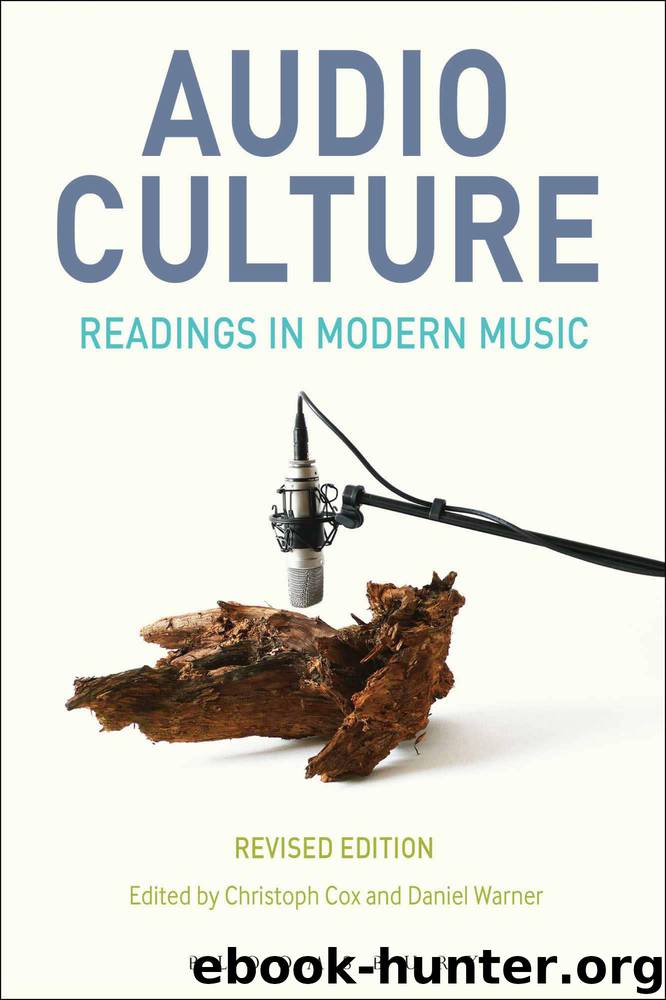Audio Culture, Revised Edition: Readings in Modern Music by Christoph Cox and Daniel Warner

Author:Christoph Cox and Daniel Warner
Language: eng
Format: azw3
ISBN: 9781501318382
Publisher: Bloomsbury Publishing
Published: 2017-07-27T04:00:00+00:00
A musical score is a statement about organization; it is a set of devices for organizing behavior toward producing sounds. That this observation was not so evident in classical composition indicates that organization was not then an important focus of compositional attention. Instead, the organizational unit (be it the orchestra or the string quartet or the relationship of a man to a piano) remained fairly static for two centuries while compositional attention was directed at using these given units to generate specific results by supplying them with specific instructions.
In order to give more point to the examination of experimental music that follows, I should like to detail some of the aspects and implications of the paradigm of classical organization—the orchestra. A traditional orchestra is a ranked pyramidal hierarchy of the same kind as the armies that existed contemporary to it. The hierarchy of rank is in this pattern: conductor, leader of the orchestra; section principals; section subprincipals, and, finally, rank-and-file members. Occasionally a soloist will join the upper echelons of this system; and it is implied, of course, that the composer with his intentions and aspirations has absolute, albeit temporary, control over the whole structure and its behavior. This ranking, as does military ranking, reflects varying degrees of responsibility; conversely, it reflects varying degrees of constraint on behavior. Ranking has another effect: like perspective in painting, it creates “focus” and “point of view.” A listener is given the impression that there are a foreground and a background to the music and cannot fail to notice that most of the “high-responsibility” events take place in the foreground, to which the background is an ambience or counterpoint.1 This is to say that the number of perceptual positions available to the listener is likely to be limited. The third observation I should like to make about the ranking system in the orchestra is this: it predicates the use of trained musicians. A trained musician is, at the minimum, one who will produce a predictable sound given a specific instruction. His training teaches him to be capable of operating precisely like all the other members of his rank. It trains him, in fact, to subdue some of his own natural variety and thus to increase his reliability (predictability).
I shall be using the term variety frequently in this essay and I should like to attempt some definition of it now. It is a term taken from cybernetics (the science of organization) and it was originated by W. R. Ashby.2 The variety of a system is the total range of its outputs, its total range of behavior. All organic systems are probabilistic: they exhibit variety, and an organism’s flexibility (its adaptability) is a function of the amount of variety that it can generate. Evolutionary adaptation is a result of the interaction of this probabilistic process with the demands of the environment. By producing a range of outputs evolution copes with a range of possible futures. The environment in this case is a variety-reducer because it “selects” certain strains by allowing them to survive and reproduce, and filters out others.
Download
This site does not store any files on its server. We only index and link to content provided by other sites. Please contact the content providers to delete copyright contents if any and email us, we'll remove relevant links or contents immediately.
| Anthropology | Archaeology |
| Philosophy | Politics & Government |
| Social Sciences | Sociology |
| Women's Studies |
Cecilia; Or, Memoirs of an Heiress — Volume 1 by Fanny Burney(32546)
Cecilia; Or, Memoirs of an Heiress — Volume 2 by Fanny Burney(31944)
Cecilia; Or, Memoirs of an Heiress — Volume 3 by Fanny Burney(31929)
The Great Music City by Andrea Baker(31916)
We're Going to Need More Wine by Gabrielle Union(19034)
All the Missing Girls by Megan Miranda(15956)
Pimp by Iceberg Slim(14488)
Bombshells: Glamour Girls of a Lifetime by Sullivan Steve(14057)
For the Love of Europe by Rick Steves(13907)
Norse Mythology by Gaiman Neil(13348)
Talking to Strangers by Malcolm Gladwell(13347)
Fifty Shades Freed by E L James(13232)
Mindhunter: Inside the FBI's Elite Serial Crime Unit by John E. Douglas & Mark Olshaker(9320)
Crazy Rich Asians by Kevin Kwan(9277)
The Lost Art of Listening by Michael P. Nichols(7494)
Enlightenment Now: The Case for Reason, Science, Humanism, and Progress by Steven Pinker(7306)
The Four Agreements by Don Miguel Ruiz(6744)
Bad Blood by John Carreyrou(6611)
Weapons of Math Destruction by Cathy O'Neil(6264)
